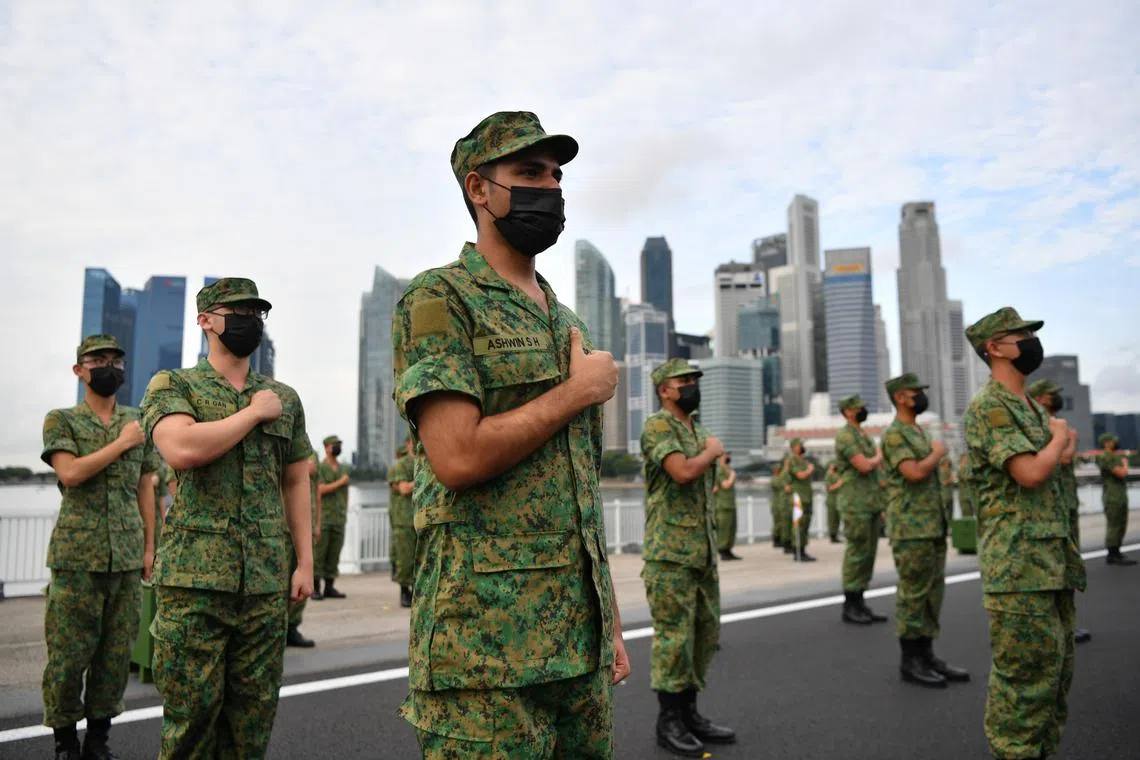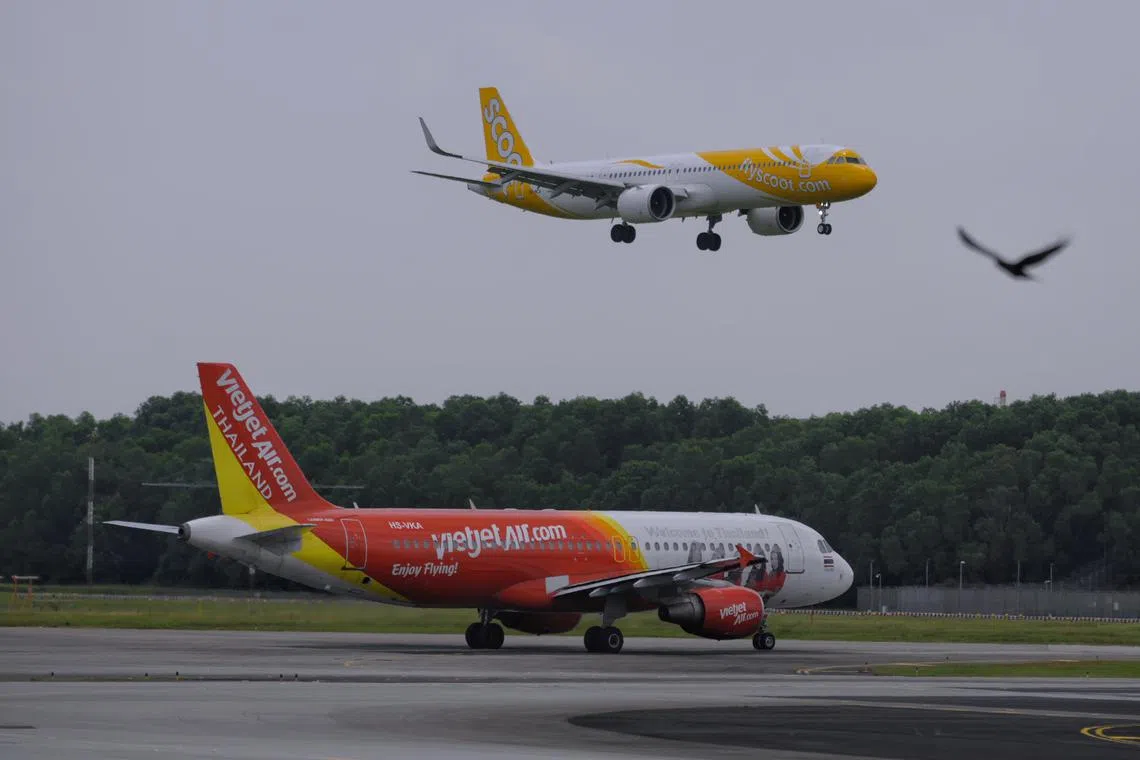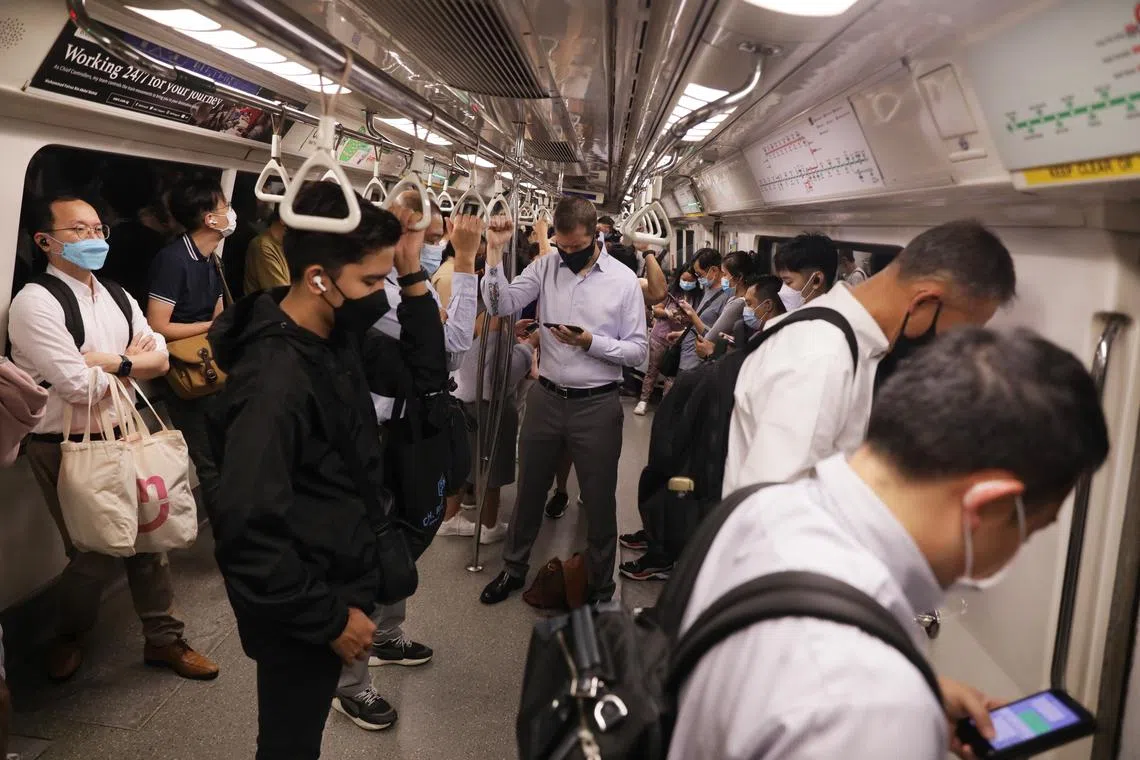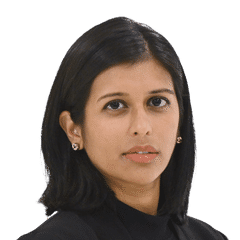Ministries move to strengthen resilience and tackle evolving threats
Sign up now: Get ST's newsletters delivered to your inbox

More programmes and training will also be put in place to give servicemen more realistic experiences.
PHOTO: ST FILE
SINGAPORE - Amid a more volatile and complex geopolitical and security landscape, steps will be taken to transform the Singapore Armed Forces (SAF) and strengthen national service (NS) and defence cooperation, said Defence Minister Ng Eng Hen.
In his ministry’s addendum on Thursday to the President’s Address, Dr Ng said that a strong defence safeguards Singapore’s sovereignty, and ensures peace and security for its people to pursue economic and social progress.
Hence, the Ministry of Defence (Mindef) and SAF are transforming to deter and defend against emerging and evolving threats in multiple domains, across the spectrum from peace to war, he said.
Employing new technology, building digital capabilities and using data analytics and artificial intelligence for future command and control information systems will be key priorities for the ministry.
More programmes and training will also be conducted to give servicemen more realistic experiences. Investments in overseas facilities will also allow the SAF to conduct large-scale exercises that cannot be replicated locally.
Calling NS the “bedrock of Singapore’s defence”, Dr Ng said the experience for future national servicemen will be improved.
This will entail reviewing the medical classification system, expanding work-learn schemes for full-time national servicemen and redesigning vocational roles.
Operationally ready national servicemen will also see expanded opportunities to apply their civilian expertise in operational contexts.
Policies and procedures will also be relooked, while technology will be incorporated into the NS journey to make processes and services more efficient and convenient.
On the international front, Dr Ng said that multilateral and bilateral defence cooperation must be strengthened.
As a small nation state, Singapore must uphold a global order and regional security architecture that is based on openness, inclusivity and adherence to international law and norms, he said.
This is done by building trust, facilitating constructive dialogue and encouraging practical cooperation through multilateral platforms such as the Asean Defence Ministers’ Meeting and the Shangri-La Dialogue, among others.
He added that every Singaporean has a part to play in keeping the nation safe and secure.
The ministry will pursue new ways to encourage Singaporeans to engage in Total Defence activities. This includes partnering with more communities to enhance individual and collective emergency preparedness to tackle potential crises, and encouraging ground-up initiatives to put Total Defence into action.
“By working together and remaining committed to the defence of our nation, we will continue to safeguard our security, sovereignty and way of life,” said Dr Ng.
Working closely with partners
These efforts by Mindef will be complemented by the work of the Ministry of Foreign Affairs.
Beginning with Singapore’s immediate neighbours, Foreign Minister Vivian Balakrishnan said it will work closely with Malaysia, Indonesia and Brunei to deepen ties and expand cooperation in emerging areas.
With Malaysia, the priority is to enhance the lives and livelihoods of people on both sides through projects like the Johor Bahru-Singapore Rapid Transit System Link.
Dr Balakrishnan said: “At the same time, we will manage our differences pragmatically and constructively.”
On Indonesia, he said Singapore is exploring opportunities to collaborate on future-oriented issues such as the digital economy, sustainable development and human resource development, and the green economy.
Likewise, Singapore will work with Brunei in areas such as education and the green economy, as well as build supply chain resilience.
While it is important that Singapore builds overlapping circles of friends, its innermost circle comprising its immediate neighbours and Asean remains a cornerstone of its foreign policy, said Dr Balakrishnan.
Asean-led mechanisms, he noted, have brought major powers such as the United States and China, as well as regional players, to the same table.
He said: “We welcome the interest of major powers to engage Asean on our own merits, and to take clear stakes in the peace, stability and development of our region, which will create a stable balance of power in the Asia-Pacific.”
Amid the pushback against globalisation and free trade, he said Singapore must continue to press ahead with global economic integration and seize opportunities in emerging areas.
As the world experiences heightened geopolitical tensions, Dr Balakrishnan said there is an exacerbated risk of foreign interference in Singapore’s public discourses on global and domestic policies.
He pledged that the ministry will continue to engage Singaporeans on foreign policy principles to give them a better understanding of the country’s long-term national interests and vulnerabilities.
Addressing threats and updating laws
On the home front, Minister for Home Affairs K. Shanmugam pointed out that while Singapore remains one of the safest countries in the world, there are significant and emerging threats that need to be addressed.
These include continuing the fight against terrorism, tackling criminal syndicates that are using sophisticated technology across national boundaries for online scams and cybercrimes, and keeping Singapore drug-free as more people around the world become more receptive to allowing and using psychoactive substances.
The ministry will update Singapore’s laws to deal with emerging threats, said Mr Shanmugam, who is also the Minister for Law.
He said new legislation will soon be introduced to better protect Singaporeans from online criminal activity, including scams and malicious cyber activity.
Law enforcement agencies will also be given more power to deal with money mules who assist in the laundering of scam proceeds and to curb the abuse of Singpass credentials to perpetrate scams.
The Home Team will continue to leverage technology such as data analytics, robotic and unmanned systems to increase operational effectiveness, reduce operational risks and enable its officers to focus on higher value tasks.
Another key pillar of defence against these threats is a vigilant, informed and discerning public, said Mr Shanmugam. He highlighted initiatives and programmes such as the Community Watch Scheme and the SGSecure movement.
He said: “With the support of Singaporeans, the Home Team will strive to keep Singapore a safe and secure home for all.”
Building a resilient, secure and sustainable Singapore
Here are the key highlights of ministries’ plans to strengthen the nation’s defence capabilities against threats, remain relevant globally and foster a more sustainable way of life.
Tackling emerging and evolving threats

An anti-scam placard placed outside Clementi 448 Market and Food Centre on January 26, 2022.
ST PHOTO: LIM YAOHUI
The Ministry of Home Affairs will update laws to better protect Singaporeans. This includes new and stronger laws against online criminal activities and scams, and the introduction of the Maintenance of Racial Harmony Act to encourage tolerance among racial groups. The Home Team’s operational effectiveness will be enhanced by leveraging technology, and training and developing its officers.
The Ministry of Defence’s (Mindef) vision for transforming the Singapore Armed Forces into a next-generation defence force by 2040 will entail continued investment in technology to deter and defend against emerging and evolving threats across the land, sea, air and digital domains.
The Ministry of Sustainability and the Environment (MSE) plans to fortify Singapore’s food security by diversifying food import sources and ramping up local production capabilities and capacities. It will also strengthen water security and safeguard pulbic hygiene through continued vector control and risk surveilance efforts.
The National Security Coordination Secretariat (NSCS) will work with agencies to mitigate risks to the flow of essential supplies and strengthen resilience against global supply disruptions. As security risks become more multifaceted and interlinked, the NSCS will support government agencies with resources and funding as they build the capacity and capability to address them.
Securing Singapore’s place in the world

Generic pix at Changi Airport shot on March 24, 2023. Captions to come.
ST PHOTO: MARK CHEONG
The Ministry of Foreign Affairs will continue to contribute to the shaping of emerging rules and norms governing the global commons, inculding in climate change and sustainability. Singapore will continue to advocate for adherence to and the strengthening of multilateralism and international law, and push for global economic integration.
Mindef will strengthen multilateral cooperation to address common threats through platforms such as regional and international defence and security meetings. It will also promote research and information sharing among regional partners on emerging cyber security and information threats.
The Ministry of Transport (MOT) will secure Singapore’s connectivity to the world and its position as an aviation and maritime hub through infrastructure investments over the next two decades. MOT will also work with industry partners in these two sectors to develop work-study programmes, support job conversions and upskill mid-career workers.
Creating a sustainable, liveable city

Morning crowd wearing masks on the MRT on Jan 25, 2023.
ST PHOTO: KELVIN CHNG
MSE will have programmes to help enterprises and households become more energy efficient. It will also lead the public service’s sustainability efforts, which include publishing annual GreenGov.SG reports and requiring statutory boards to disclose their environmental sustainability efforts, progress and plans. The ministry will also look to shift attitudes from a “make-use-throw” mindset to that of embracing a circular economy and zero waste culture.
By expanding the rail network to improve connectivity, MOT hopes that more Singaporeans will opt for public transport over private vehicles. It also aims to make roads more pedestrian-friendly, especially for the elderly and persons with disabilities. MOT will drive the transition to cleaner-energy vehicles, including industrial ones such as airside vehicles at Changi Airport and harbour craft.



